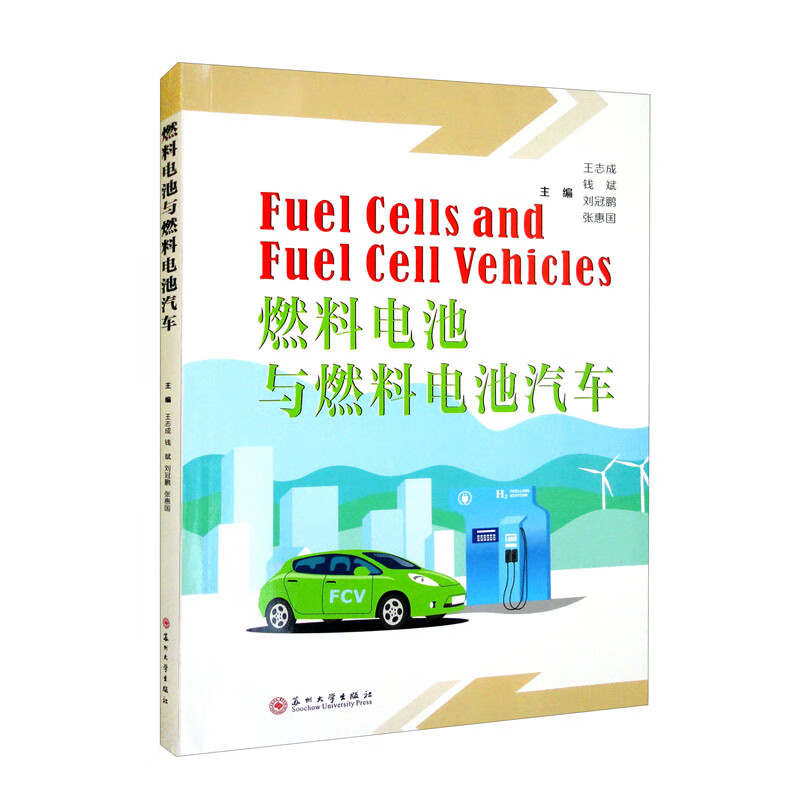- ISBN:9787567238886
- 装帧:一般胶版纸
- 册数:暂无
- 重量:暂无
- 开本:24cm
- 页数:263页
- 出版时间:2022-06-01
- 条形码:9787567238886 ; 978-7-5672-3888-6
内容简介
Fuel cell(FC)is an effective and environmentally friendly electrochemical power generation device, which can directly convert the chemical energy of fuel and oxidant into electric energy. Nowadays, with the increasingly serious problems of environmental pollution and energy shortage, the research & development(R&D)and application of FC technology have attracted more and more attention from governments and researchers worldwide, Compared with other types of new energy vehicles, fuel cell vehicles(FCVs)have apparent advantages. Hence, with the development of research & development and engineering of the hydrogen preparation, storage, transportation, and application of hydrogen and the breakthroughs in FC retaled technologies, FCVs will have a more important position and broad prospects in developing new energy vehicles in the future. With the gradual practicality and marketization of FCVs, there will be more and more demand for personnel engaged in the design and manufacture, operation and maintenance, sales and promotion of FCVs. Therefore, it is urgent to cultivate engineering and technical talents to adapt to the fast growth of industry. The book is written under this background. The book consists of 5 chapters. Chapter 1 is compiled by Wang Zhicheng, which mainly introduces the working principle, classification, development history, characteristics, and application of FCs. Chapter 2 is compiled by Qian Bin to mainly present the electrochemical basis, polarization and the test method for polarization of FCs. Chapter 3 is compiled by Wang Zhicheng and Liu Guanpeng, which mainly introduces six FC types and emphasizes proton exchange membrane fuel cell(PEMFC), solid oxide fuel cell(SOFC)and alkaline fuel cell(AFC). Chapter 4 is compiled by Wang Zhicheng to mainly introduce the preparation, purification and storage of hydrogen for FC. Chapter 5 is compiled by Zhang Huiguo and Wang Zhicheng to mainly present the knowledge and the infrastructure facilities relating to FCVs. Wang Zhicheng is in charge of the final compilation and editing of the whole book.
目录
1.1 Working Principle of Fuel Cell
1.2 Classification of Fuel Cell
1.3 Development History of Fuel Cell
1.4 Characteristics of Fuel Cell
1.5 Application of Fuel Cell
References
Chapter 2 Electrochemical Basis of Fuel Cell
2.1 Fuel Cell Thermodynamics
2.1.1 Relationship Between Gibbs Free Energy and Electromotive Force of Cell
2.1.2 Nernst Equation
2.1.3 FC Efficiency
2.2 Kinetics of Electrode Process
2.2.1 Faraday's Law and Electrochemical Process Rate
2.2.2 Electrochemical Reaction Rate
2.3 Polarization
2.3.1 Electrochemical Polarization
2.3.2 Concentration Polarization
2.3.3 Ohmic Polarization
2.4 Polarization Test
References
Chapter 3 Fuel Cell Type
3.1 Proton Exchange Membrane Fuel Cell
3.1.1 Structure and Working Principle of PEMFC
3.1.2 Development History of PEMFC
3.1.3 Main Components of PEMFC
3.1.4 Single Cell and Cell Stack of PEMFC
3.1.5 Analysis of PEMFC Stack Failure
3.2 Direct Methanol Fuel Cell
3.2.1 Structure and Working Principle of DMFC
3.2.2 Key Materials of DMFC
3.2.3 Differences Between DMFC and PEMFC
3.2.4 Existing Problems of DMFC
3.2.5 Application of DMFC
3.3 Solid Oxide Fuel Cell
3.3.1 Structure and Working Principle of SOFC
3.3.2 Development Overview of SOFC
3.3.3 Key Materials of SOFC
3.3.4 Development Trend of SOFC
3.3.5 Problems of SOFC
3.3.6 SOFC Stack
3.3.7 High Power Density SOFC
3.4 Alkaline Fuel Cell
3.4.1 Structure and Working Principle of AFC
3.4.2 Development Overview of AFC
3.4.3 Key Materials of AFC
3.4.4 Drainage of AFC
3.4.5 Advantages and Disadvantages of AFC
3.4.6 Single Cell and Cell Stack of AFC
3.5 Phosphoric Acid Fuel Cell
3.5.1 Structure and Working Principle of PAFC
3.5.2 Development Overview of PAFC
3.5.3 PAFC Materials
3.5.4 PAFC Stack
3.5.5 Factors Affecting PAFC
3.5.6 Factors Affecting Lifetime and Improvement Methods
3.5.7 Advantages and Disadvantages of PAFC
3.6 Molten Carbonate Fuel Cell
3.6.1 Structure and Working Principle of MCFC
3.6.2 Development Overview of MCFC
3.6.3 Key Materials of MCFC
……
Chapter 4 Preparation, Purification and Storage of Hydrogen Fuel for Fuel Cells
Chapter 5 Fuel Cell Vehicle
Acronyms
-

小家电使用与维修
¥4.3¥11.5 -

金属切削液配方与制备手册
¥142.6¥198.0 -

食品加工机械与设备(高等职业教育食品智能加工技术专业教材)
¥26.3¥46.0 -

发电厂电气部分
¥38.1¥58.0 -

植物进化的故事
¥19.9¥59.0 -

公路路基设计规范
¥54.9¥98.0 -

袖珍实用色谱
¥15.3¥45.0 -

再话土力学
¥54.9¥98.0 -

低空无人机集群反制技术
¥82.6¥118.0 -

奋楫笃行,臻于至善——广州公交服务再提升探索与实践
¥57.0¥80.0 -

手术机器人导航与控制
¥118.9¥169.8 -

汽车车身构造与修复
¥30.7¥45.0 -

群目标分辨雷达初速测量技术
¥42.4¥69.0 -

矿产勘查项目设计实习指导书
¥24.0¥32.0 -

秸秆挤压膨化技术及膨化腔流道仿真研究
¥45.0¥55.0 -

NVH前沿科技与工程应用
¥109.7¥159.0 -

继电保护原理
¥30.4¥49.0 -

孟山都的转基因之战
¥39.0¥69.0 -

船舶分段装配
¥58.6¥80.0 -

汽车故障综合诊断技术
¥65.6¥95.0
















